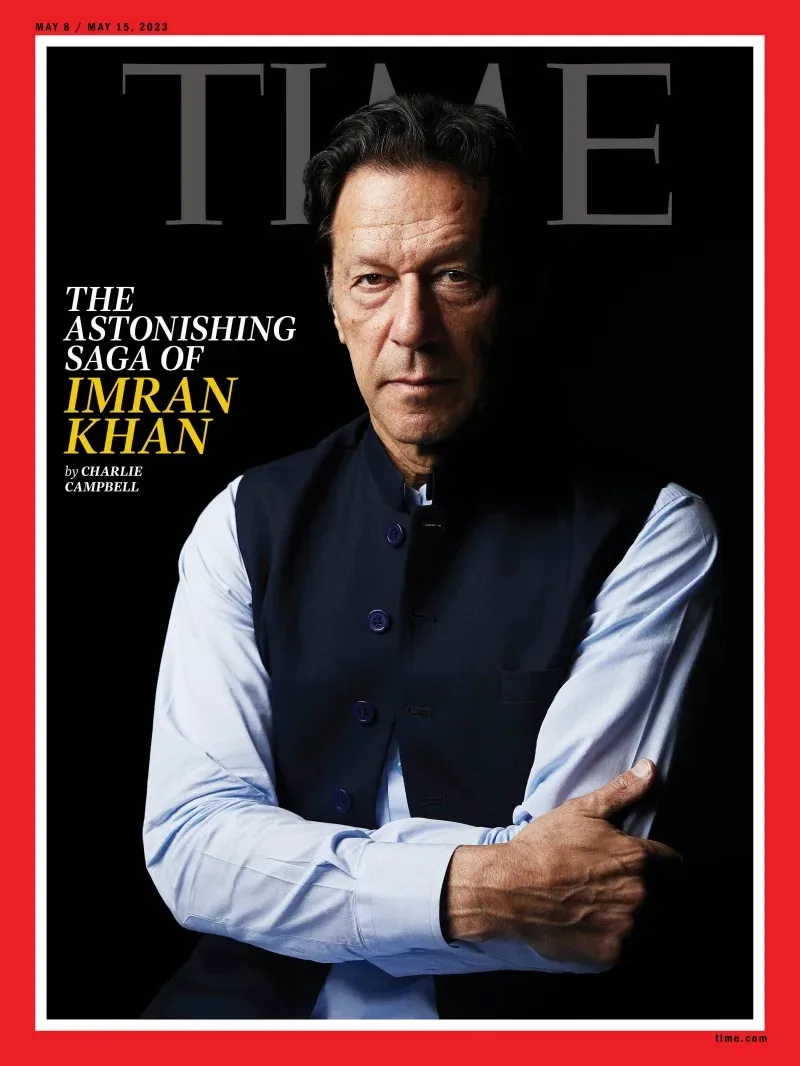The former Prime Minister and Chairman Pakistan Tehreek-e-Insaf (PTI) Imran Khan has once again insisted on his stance that it was the United States which caused his ouster from power in April last year.
In an exclusive interview with the American News Magazine ‘TIME’, Imran Khan referring to his ouster in a parliamentary no-confidence vote in April 2022 claimed that ‘he was unfairly toppled by a US-sponsored plot’.
Imran Khan’s Exclusive Interview with TIME published on April 04, 2023;
In late March, TIME spoke with former Pakistan Prime Minister Imran Khan by Zoom from his home in Lahore for a new cover story. Khan was ousted in a parliamentary no-confidence vote last April, and he spent the next year holding rallies to demand snap elections that might bring him back to power.
In the interim, Khan has survived an assassination attempt, been hit with a flurry of charges that he claims are concocted to disqualify him from reentering politics, and narrowly avoided arrest amid pitch battles between police and supporters outside his home in Lahore.
Here are five takeaways from Khan’s wide-ranging conversation with TIME.
Khan still believes his life is in danger
In November, Khan was shot three times in the leg after a gunman opened fire at his container-mounted truck during a rally, injuring several supporters and killing one. A suspect was arrested at the scene and claimed he was motivated by Khan’s PTI party allegedly playing campaign music during the Islamic call to prayer. But Khan believes three figures in the current government are ultimately responsible. (They all deny the accusation.) Khan tells TIME he had long expected an assassination attempt and fears more may be launched.
“For one and a half months before [my shooting], I was warning that this is what is going to happen,” Khan says. “I told them that they will bump me off and blame a religious fanatic. Because I was in power for three and a half years and, from within the intelligence agencies, they would give me this information. So now, [my supporters] outside [my home] believe that if they arrest me, they will kill me.”
2. The causes of Pakistan’s economic crisis are structural
Pakistan is locked in a spiraling economic crisis with inflation in March rising a record 47% year-over-year and the rupee plummeting by 54% over the same period. The nation has only $4.6 billion in foreign reserves—$20 per citizen—and avoiding default rests on unlocking a stalled International Monetary Fund bailout. For decades, Pakistan’s economy has relied on foreign cash to balance the books, but the cash has largely dried up since the Trump administration in 2018 halted the $300 million security assistance the U.S. used to provide annually.
“The biggest problem is that we bought far more than we export,” says Khan. “And none of our governments paid any attention to increasing our exports. Whenever your economy starts to grow, the imports increase [and] we run out of dollars. And we end up having to go to IMF. In Pakistan, with a population of 220 million people, there are only about 2.5 million taxpayers. People don’t pay taxes and especially the rich elite.
“We have a huge debt [and] the reason why we can’t service the debt is because you have to create wealth. But what would create wealth is your industry and agriculture; they’re both contracting. There’s no one to invest in Pakistan from outside or within. They have lost all confidence in the government. Our default risk ratio is almost 100%. Our bonds have become worthless, so no-one is willing to lend us money.”
3. Khan wanted to use cricket to encourage investment and develop a tourism industry in Pakistan
International test cricket—the most prestigious form of the game—had not been played in Pakistan since 2009, when a terrorist attack on the visiting Sri Lankan team killed six people in Lahore. Under Khan’s premiership, Pakistan hosted Sri Lanka in 2019 for the first test match in the country in a decade. Khan, a former captain of the national cricket team, says the “normalization” of visiting Pakistan was important for reasons bigger than sport.
“Number one is investment,” says Khan. “The more normalized situation you have, the more chances of investment coming into Pakistan. Businessmen were meeting Pakistanis in Dubai; they would refuse to come to Pakistan. So how can you grow an economy in that sort of atmosphere?
“Second is tourism, because Pakistan has huge tourism potential. We have one of the most diverse countries … and we need tourism to get more dollars and offset this current account deficit. So I had planned to open up various tourist resorts, but unfortunately two years of COVID meant that there was hardly any tourism anywhere in the world.”
4. Pakistan handled the COVID-19 pandemic well because the government and military were aligned
One of the drivers of last April’s no-confidence vote was Khan losing the backing of Pakistan’s powerful military. He claims it was the generals’ unwillingness to go after influential families for alleged corruption that caused their relationship to fray. However, analysts say that Khan lost the backing of the brass hats after he refused to endorse their choice to lead Pakistan’s intelligence services, known as ISI, because of his close relationship with the incumbent. They also appeared uneasy regarding Khan’s relentless taunting of the U.S., with whom Pakistan’s military is keen to retain friendly ties.
In any case, Khan says that there were occasions during his tenure when the military and government worked well together, such as tackling the COVID-19 pandemic, when Pakistan recorded deaths per capita just a third that of neighboring India. “On some things, like COVID-19, we were all on one page,” says Khan. “So we had their logistics support, because it was all over the country, and they really helped, so we did a great job. But when they, for instance, opposed accountability [for alleged corruption], I couldn’t do anything.”
5. He still believes that the US was behind his ouster
Khan tells TIME that Donald Lu, US Assistant Secretary of State for Central and South Asia, warned Pakistan’s Ambassador to the US last March that “there will be consequences” unless he was ousted as prime minister. “The next day, the vote of confidence takes place in the National Assembly,” says Khan. The State Department and White House have repeatedly said there is “absolutely no truth” to Khan’s claims.




